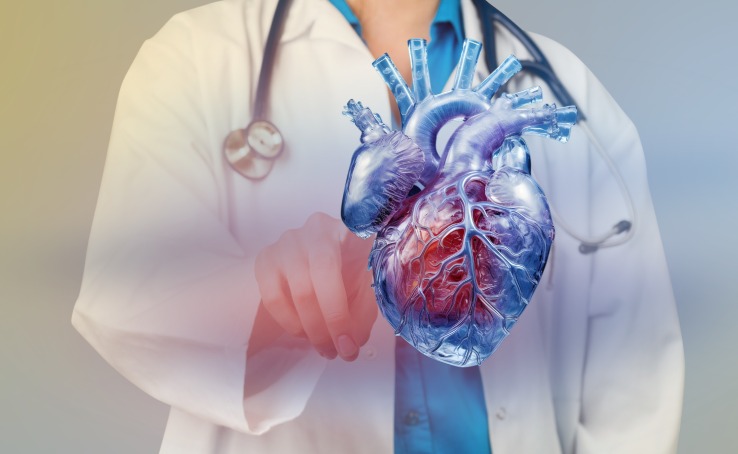Share your medical reports and get an exclusive offer tailored to your needs, requirements and preferences
Avg Price: $ 4500-$ 13000


Treatment Time
Recovery Time
Hospitalization Days
Success Rate
Coronary Heart Disease (CHD) stands as a significant contributor to both global mortality and health challenges. As per a 2005 World Health Organization (WHO) report, cardiovascular disease (CVD) was responsible for 17.5 million fatalities, accounting for 30% of the 58 million deaths globally. Over the past twenty years, there has been a concerning rise in the occurrence of coronary heart disease and cardiovascular-related deaths in countries like India and other nations in South Asia.
This underscores the requirement for treatment choices such as Coronary Artery Bypass Graft (CABG) surgery in the present scenario. This technique is frequently seen as a boon due to its significant benefits in the management of coronary heart disease (CHD) and the improvement of patients' overall health.
Around the mid-1990s, approximately 10,000 Coronary artery bypass graft (CABG) surgeries were conducted each year in India. At present, industry reports indicate that the yearly count has escalated to around 60,000 surgeries. Roughly 400,000 coronary artery bypass graft (CABG) surgeries are executed on a global scale annually, establishing it as the most frequently conducted significant surgical intervention.
The proficiency of such treatments hinge on the expertise of the medical practitioner. Within India, healthcare professionals exhibit remarkable credentials and specialized proficiency in the field of cardiovascular surgeries and heart health.
Even as a developing nation, India is swiftly transforming into a significant hub for cardiac healthcare. Particularly, medical establishments in India have been attaining remarkable progress in the field of heart care, encompassing specialized techniques like coronary artery bypass graft (CABG). Consequently, the endeavour of locating the best doctor for CABG surgery and the best hospital for CABG surgery in India is increasingly becoming more convenient and economically viable with the progressing time.
Coronary Artery Bypass Graft Surgery (CABG) is a medical technique employed for addressing Coronary Artery Disease (CAD). This disease, also known as coronary heart disease (CHD), involves the constriction of coronary arteries, which are responsible for delivering vital oxygen and nourishment to the heart muscle. It occurs due to the accumulation of fatty substances within artery walls, causing a reduction in their diameter. Consequently, this accumulation restricts the flow of oxygen-enriched blood to the heart muscle.
Your team of heart care professionals will collaborate with you to determine the suitability of CABG. This group may encompass your cardiologist, the heart specialist, and a cardiothoracic surgeon (a practitioner focused on procedures involving the heart, lungs, and chest).
Surgery might not invariably be the optimal choice for everyone. Depending on your general well-being and concurrent conditions, your care unit could suggest you the right treatment. CABG might be advantageous in situations where you have:
Take Charge of Your Health
Book a Free Consultation

The pre-evaluation is pivotal for ascertaining the appropriateness of CABG as a viable approach and for mitigating possible risks in the perioperative and postoperative periods. Below is an overview of the pre-evaluation process:
Blood Testing: The blood for recommended testing should be drawn within 30 days before your scheduled procedure. Keep in mind that you shouldn't eat or drink anything for 6 hours before this test.
Chest X-Ray: This examination provides the insight into the chest, lungs, heart, large arteries, ribs, and diaphragm. No specific preparation is needed for this test.
Electrocardiogram (ECG): An ECG measures the heart's electrical activity. Electrodes will be placed on specific areas of your body (chest, arms, and legs). This generates a graphical representation (tracing) that can indicate heart-related conditions. No special preparation is required for this test.
Pulmonary Function Test (PFTs): These tests gauge how effectively the lungs take in and release air, as well as how well they manage gases like oxygen. There's no need for preparation, and the test usually takes an hour.
Carotid Doppler/Ultrasound Study (Carotids): This ultrasound assesses carotid arteries for blockages or narrowing that could increase stroke risk. No special preparation is needed. The test typically lasts 30 minutes.
Ankle-Brachial Index (ABIs): This non-invasive test checks for artery blockages in your legs or arms, which could indicate peripheral artery disease. It's important as peripheral artery disease elevates the risk of heart attack, stroke, poor circulation, and leg pain. No preparation is necessary, and the test takes about an hour.
Surface Echocardiogram (Echo): This non-invasive evaluation examines heart valves, chambers, and overall function. No specific preparation is required for this 30-minute test.
Vein Mapping: This non-invasive assessment creates a "map" of leg veins, aiding the surgeon in preparation for bypass graft surgery. No preparation is needed. The test typically takes 30 minutes.
Trans-esophageal Echocardiogram (TEE): This invasive test examines heart valves, chambers, and function. It also assesses the diameter of the aorta. The entire process takes about 1 hour, with 2-3 hours for anesthesia recovery.
ECG-gated SPECT Myocardial Perfusion Imaging (Stress Test): This cardiac scan measures blood flow in the heart muscle at rest and during exercise. A special tracer is injected into a vein, and pictures are taken after exercise. The test may take 3-6 hours.
Heart Catheterization (Cath): It is an invasive test examining coronary blood vessels for blockages. You should not eat or drink for 6 hours before this procedure, and you'll need someone to drive you home afterward. An IV contrast dye is used, and recovery takes about 4-6 hours.
Computed Tomography Scan (CT): This scan assesses the aorta, lungs, and organs. It identifies aneurysms and other issues, aiding surgery preparation. An IV contrast dye is used, and you shouldn't eat for 6 hours before or drink for 2 hours before the test. The scan takes about an hour.
Cardiac Magnetic Resonance Imaging (MRI): This detailed test examines heart structure and function, requiring you to be metal-free due to the MRI's magnetic field.
Your Health is Our Priority
Book a Free Consultation
The Coronary Artery Bypass Graft Surgery involves creating new pathways for blood to bypass the blocked or narrowed arteries, using blood vessels harvested from other parts of the body. During your time in the operating room, you can anticipate the following procedures:
Coronary Artery Bypass Graft Surgery usually spans between 3 to 6 hours, contingent on the number of blocked arteries. Typically, a surgeon creates a lengthy incision along the center of the chest, following the breastbone. The rib cage is opened to reveal the heart. Following the chest's opening, the heart is temporarily halted using medication, and the heart-lung machine becomes operational. A section of healthy blood vessel, often taken from inside the chest wall or the lower leg, is extracted. This healthy tissue, known as a graft, is connected below the blocked coronary artery, establishing a new route for blood to bypass the obstruction. The procedure may involve the use of multiple grafts.
After the surgical procedure is completed, healthcare providers restore your heartbeat in the operating room and discontinue the heart-lung machine. The surgeon employs wires to secure the chest bone, and these wires remain in your body once the bone has healed.
Potential complications associated with Coronary Artery Bypass Graft Surgery (CABG) encompass:
Your specific medical condition may entail additional risks. It's important to address any concerns with your physician before undergoing the procedure.

During Hospitalization:
Following the Coronary Artery Bypass Graft Surgery, you'll be transferred to the Intensive Care Unit (ICU) for vigilant monitoring. Monitoring devices will continuously display your Electrocardiogram (ECG) pattern, blood pressure, pressure readings, breathing rate, and oxygen levels. The recovery process for Coronary Artery Bypass Surgery (CABG) usually necessitates a hospital stay of several days.
A tube in your throat, connected to a ventilator (breathing machine), will assist your breathing until your condition stabilizes. As you gradually awaken from anesthesia and your natural breathing resumes, your doctor can adjust the ventilator to let you gradually take over breathing. When you're sufficiently conscious and able to cough, the breathing tube will be removed by your doctor.
Subsequent to tube removal, a nurse will guide you to cough and take deep breaths every few hours. Although this might cause discomfort due to soreness, it's crucial to prevent mucus accumulation in the lungs, which could lead to pneumonia. Your nurse will demonstrate how hugging a pillow tightly against your chest while coughing can alleviate the discomfort.
The surgical incision site might be tender or sore for several days post-CABG. Follow your doctor's recommendations for using pain relievers. Note that aspirin or specific pain medications might heighten bleeding risk, so adhere to prescribed medications only.
Your doctor could administer medications through an IV to manage Blood Pressure, Heart function, and any bleeding concerns. As your condition stabilizes, these medications will be gradually reduced and then stopped.
Once the breathing and stomach tubes are removed, and your stability is confirmed, you'll begin consuming liquids. Gradually, solid foods can be reintroduced based on your tolerance.
When your doctor deems you ready, you'll be transitioned from the ICU to a post-surgical nursing unit, continuing your recovery. Your activity level will gradually increase as you start getting out of bed and walking for longer durations. Solid foods can be resumed once your tolerance allows.
Once home, it's important to maintain cleanliness and dryness around the surgical area after Coronary Artery Bypass Graft Surgery. Your doctor will provide specific bathing instructions. If not removed before leaving the hospital, your doctor will take out sutures or surgical staples during a subsequent hospital visit. Refrain from driving until your doctor confirms it's safe. You might also have additional activity restrictions.
Inform your doctor if you experience:
Your doctor may offer further instructions post-procedure, according to your situation.
Avail the Expert Health Advice
Book a Free Consultation
The process of recuperation following a Coronary Artery Bypass Graft Surgery is a gradual one, with individuals recovering at varying paces. Typically, you should be capable of sitting in a chair within the first day, walking within three days, and manoeuvring stairs around five to six days. The majority of individuals achieve complete recovery within a span of 12 weeks from the surgery. However, if complications arise during or post-surgery, the duration of your recovery is likely to extend.
A subsequent appointment for follow-up is recommended, usually scheduled around 6 to 8 weeks after the surgical procedure.
Adhering to the discharge plan and engaging in a cardiac rehabilitation scheme constitute the most effective strategies for recuperating from bypass surgery. The significance of post-operative care cannot be overstated, as individuals who have undergone bypass surgery face a notably heightened susceptibility to further cardiac incidents. These may encompass recurring chest discomfort, heart attacks, heart failure, and an elevated risk of mortality.
Coronary Artery Bypass Graft Surgery continues to be a recognized treatment option for Coronary Heart Disease, with most procedures addressing cases of disease in multiple vessels. On the whole, there is low mortality rate associated with this surgery, approximately ranging from 2% to 3%. Nonetheless, this advantage is counterbalanced by a complication rate of roughly 20% to 30%.
The survival rates post CABG surgery over a span of twenty years varied by age: 55% for those under 50 years old, 38% for individuals aged 50 to 59, 22% for those aged 60 to 69, and 11% for those over 70 at the commencement of the initial surgical procedure. The survival rates at the 20-year mark after surgery, considering the presence or absence of hypertension, stood at 27% and 41% respectively. Likewise, the twenty-year survival rates were 37% for men and 29% for women.
India's healthcare system capitalizes on decreased labour and infrastructure costs, enabling healthcare establishments to furnish services at more affordable prices. Moreover, the presence of proficient medical experts combined with a competitive market cultivates economically efficient approaches. Additionally, India's thriving pharmaceutical sector frequently manufactures generic drugs, which contributes to a decrease in the overall cost of treatment. This is the reason for the relatively reduced cost of Coronary Artery Bypass Graft Surgery in India in comparison to other nations.
| Location | Minimum Cost ($) | Average Cost ($) | Maximum Cost ($) |
| Delhi | $ 4500 | $ 5500 | $ 12000 |
| Mumbai | $ 4800 | $ 5000 | $ 13000 |
| Chennai | $ 4500 | $ 6500 | $ 12200 |
| Hyderabad | $ 4550 | $ 6500 | $ 12500 |
Nonetheless, the cost of Coronary Artery Bypass Graft Surgery in India might fluctuate contingent on the subsequent key aspects:
The expenses associated with the preliminary assessments and examinations conducted prior to the Coronary Artery Bypass Graft Surgery might cover various diagnostic procedures. These additional charges encompass tests such as X-Rays, CT Scans (Computed Tomography), MRI scans (magnetic resonance imaging), Pulmonary Function Tests (PFTs), Carotid Doppler/Ultrasound Studies (Carotids), Ankle-Brachial Index (ABIs), Surface Echocardiograms (Echo), Vein Mapping, Trans-Esophageal Echocardiograms (TEE), ECG-gated SPECT myocardial perfusion imaging (stress test), heart catheterization (Cath), cardiac magnetic resonance imaging (MRI), and other diagnostic evaluations. The total expenses for these tests can vary between INR 1,00,000 and INR 1,50,000.
MedFlick, your trusted healthcare companion, is dedicated to ensuring that your medical journey goes as smoothly and successfully as possible.
Fostering expertise backed by commitment, resilience and years of experience, we connect you to a wide network of India's best doctors
Explore the most advanced, reputable and trusted hospitals in India, offering the highest levels of clinical and surgical excellence

The worlds most trusted personalized health community with more than 1,00, 000 members that share their journey, experiences and health insights. Join your community and get access to make informed health decisions.
Explore


